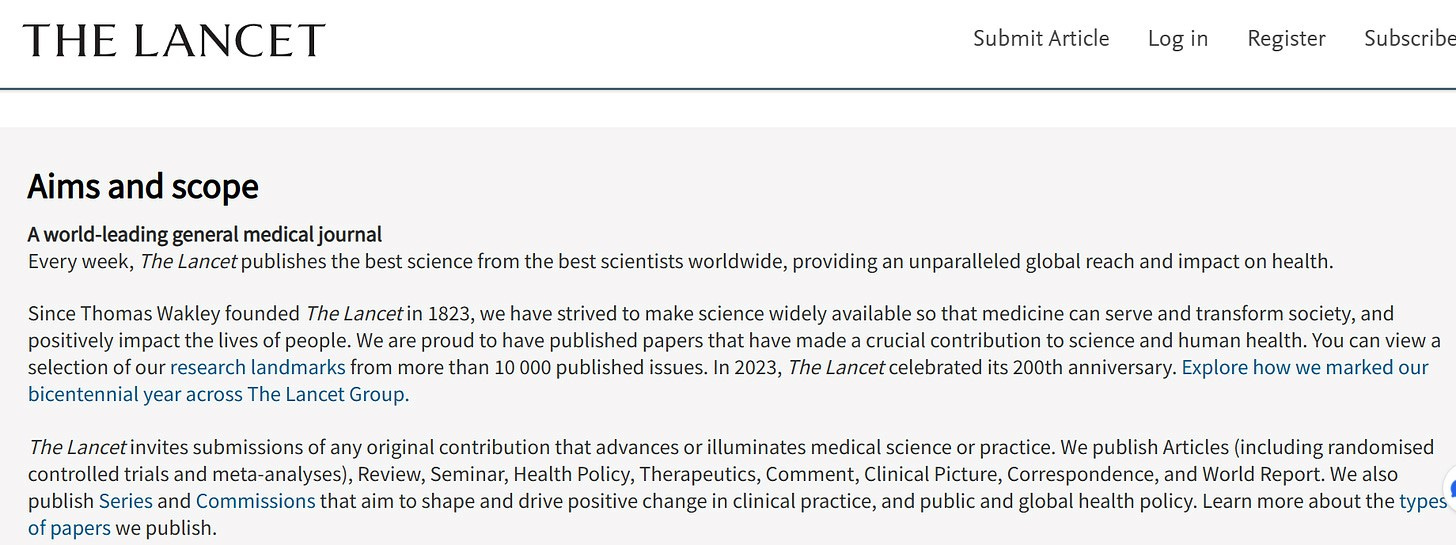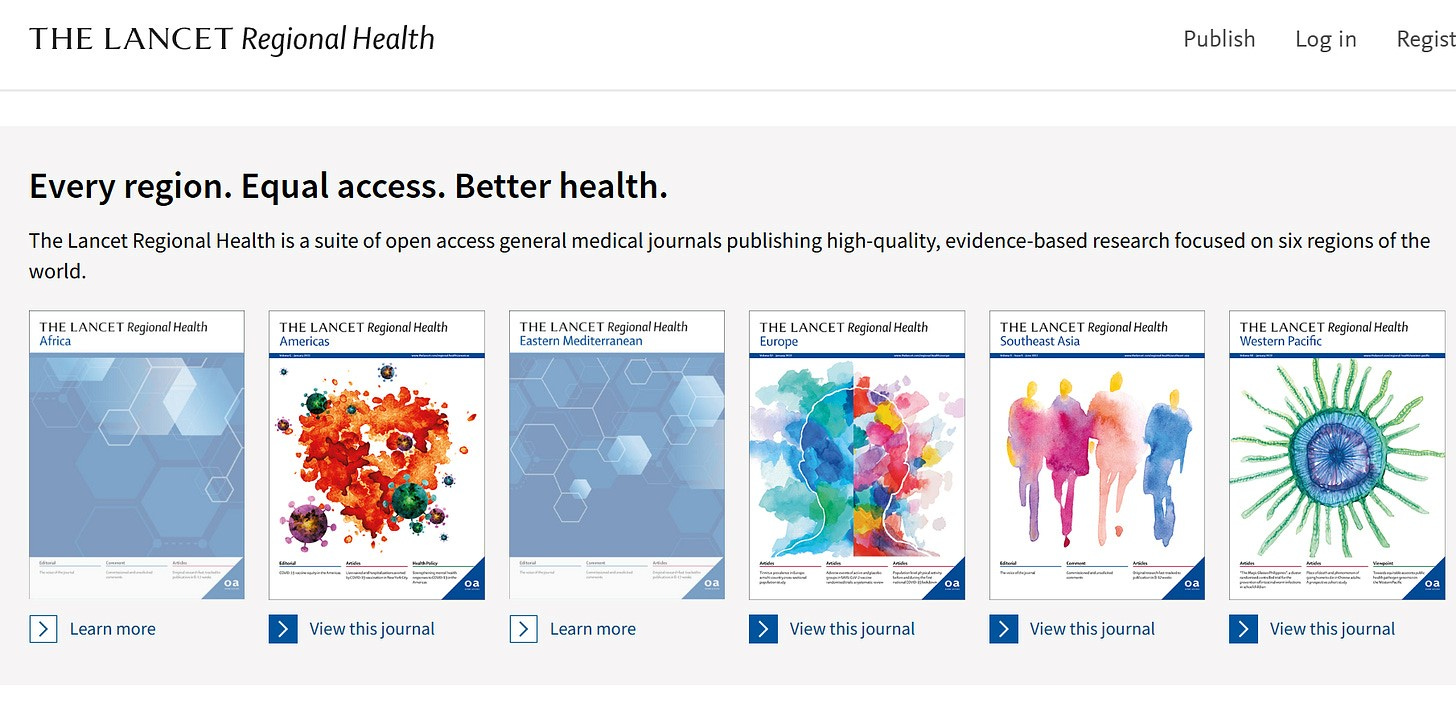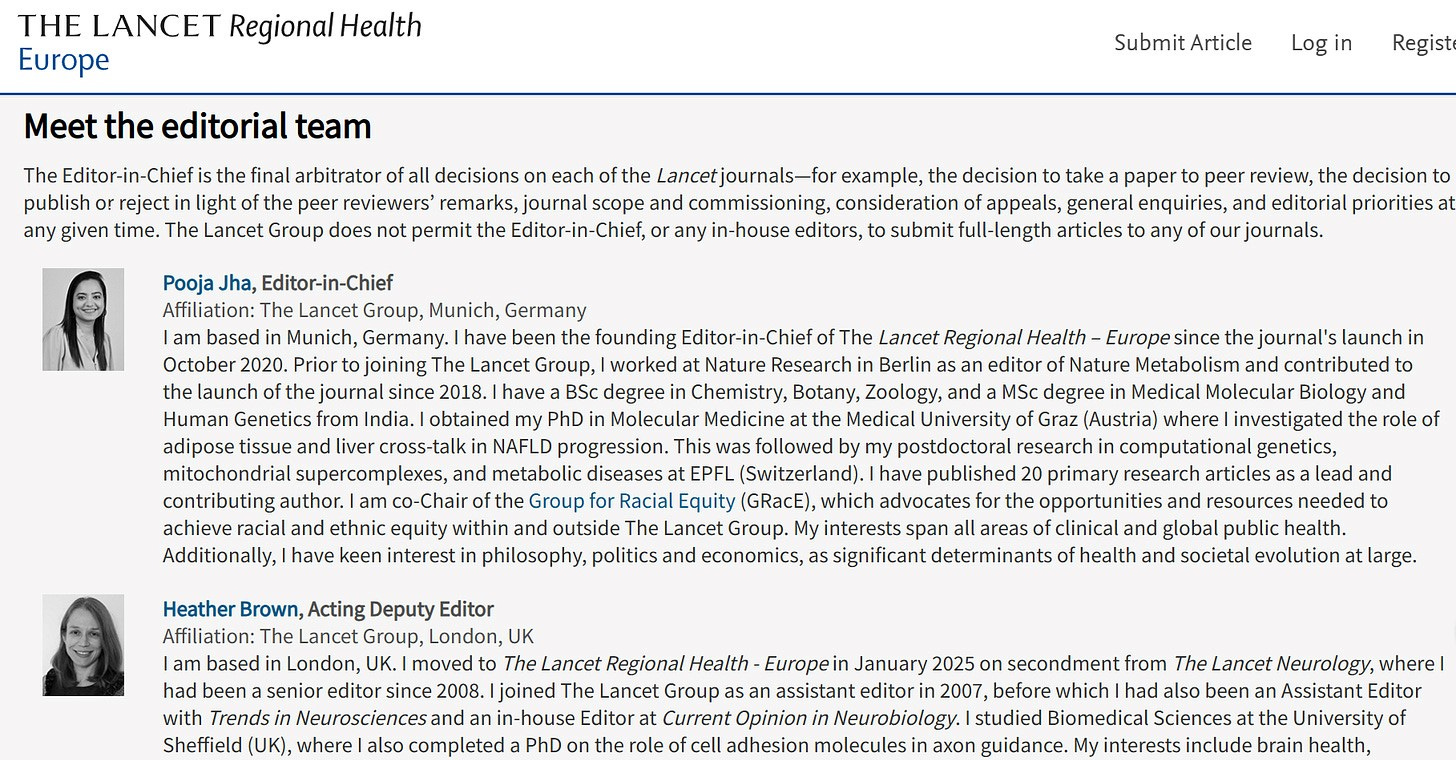A modest proposal to critically assess the brief editorial “The Italian health data system is broken” published on The Lancet Regional Health Europe
In recent days, there has been a significant surge in commentaries regarding the editorial published in The Lancet Regional Europe titled "The Italian health data system is broken."
Many prominent figures in the Italian healthcare sector have reacted vehemently to this text, expressing contrasting views. A few have deemed the journal's criticism inappropriate, most have seen them as a wake-up call and as confirmation of the harmful consequences of effectively having 21 separate regional healthcare systems, whose differences have only been amplified over time and may be further enhanced due to the planned governmental measures.
The Lancet and The Lancet Regional Health Europe are two different journals!
Many important thought leaders and media outlets, however, mentioned that the editorial was published in The Lancet, while as a matter of fact the editorial was published on another journal. Let’s look at some facts.
The Lancet is universally recognized as one of the most authoritative medical journals in the world, with a distinguished history dating back to 1823. Its most recent Impact Factor stands at 98.4, reflecting the rigor of its peer-review process and the quality of the original research it publishes, selected by an editorial board of top-tier experts led by Richard Horton.
The Lancet primarily features original research articles, systematic reviews, and in-depth analyses that significantly influence global health policies and clinical practice. However, despite its exceptional quality, The Lancet has, over time, published unsuitable content (subsequently retracted after many years and multiple reports), such as Andrew Wakefield’s text on autism and vaccines and Paolo Macchiarini’s fraudulent studies on trachea transplants. Also other authoritative peer reviewed journals have made significant retractions, acknowledging frauds or material mistakes, which unfortunately are common also for the best publishers and most experiences Editors-in-Chief.
To begin with, I would like to discuss a bit more why generalist media and subject matter experts hold significant responsibility in disseminating distorted and partial news, which can mislead inattentive or less knowledgeable readers. We will then explore in greater detail the contents of “The Italian health data system is broken.”
The editorial we are discussing (important note: it is not an Original Research Article or a Review Article) was published in “The Lancet Regional Health Europe”, part of the journal portfolio “The Lancet Regional Health”. These journals are part of The Lancet portfolio, launched more recently than the "parent" journal, with distinct ISSNs and dedicated to specific geographic areas, such as Europe or the Americas. While these publications provide an important platform for research contextualized at a local level, in many cases, they have a significantly lower Impact Factor.
Editorial vs. scientific article: a fundamental difference
An editorial, such as the one published in The Lancet Regional Health, is a very brief and unsigned piece that cannot be equated with a scientific article. Scientific articles are grounded in research protocols, include detailed methods, data analysis, and verifiable results, and must undergo a rigorous peer-review process, particularly in high-impact journals. Editorials, on the other hand, are opinions or analyses written by members of the journal's editorial board or invited experts. Their purpose is to spark debate, provide interpretations, or offer recommendations, but they do not present new data or experimental findings.
The editorial in question discusses the fragmentation of the Italian healthcare system and its implications for health data collection. While the topic is relevant and the analysis offers useful reflections, the scientific value of its statements is lower compared to an article based on original data and rigorous methodology. Ultimately, it represents only the opinion of the editorial board members.
In an academic or scientific context, editorials play an important role in guiding research priorities or outlining perspectives but cannot be considered on par with studies that provide concrete evidence. The prestige and impact of a published piece depend not only on the journal but also on the type of contribution.
The editorial highlights significant issues in the Italian healthcare system—many of which have been widely recognized for a long time by industry insiders—focusing on data fragmentation and its implications. However, in my view, some of the statements appear partial, generic, or lack adequate empirical support.
Although unsigned, it is possible to trace the contributors to the editorial via LinkedIn, as highlighted by the Editor-in-Chief of the journal, Pooja Jha, on her profile. The contributors are Maria Bergami, Edina Cenko, and Raffaele Bugiardini from the University of Bologna.
The editorial states that over 90,000 Italians refuse to share their health data. To confirm such claims the authors of the text provide just a link, leading to a generalist media outlet Sky TG24 article dated 26 June 2024, which mentions as a primary source another article published by the Italian daily newspaper La Repubblica on the same datre, 26 June 2024. The other references are a a few other links to websites such as www.statista.com, www.regioni.it and “Il Sole 24 Ore”, one of the most important Italian economics and finance daily newspapers.
Was there really no other primary academic source to rely on? Ministry of Health? National Health Agencies? Moreover, while the figure may appear striking when presented in absolute terms, why are other countries not mentioned for comparison, for example Germany, in which similar concerns for privacy were emphasized? This absence of a contextualization raises further questions about the editorial's approach. Including a broader perspective, such as data from countries with similar healthcare systems or challenges, could have provided a more balanced and informative analysis.
At the end of 2023 the European Parliament voted in favor of creating a "European Health Data Space", while opposing the mandatory implementation of electronic records for all citizens, yet supporting access to sensitive health data without patient consent. The issues highlighted for Italy are, in fact, common to many other countries. Unfortunately, The Lancet Regional Health – Europe editorial fails to provide this broader context, amplifying Italy's situation as though it were an isolated case.
It is also asserted that the Italian healthcare system prevents the use of data without consent, overlooking the fact that IRCCS (Medical Research Institutions) and other sites in Italy are authorized to do so in compliance with GDPR, as clarified by the Italian Garante per la Protezione dei Dati Personali - Italian Data Protection Authority (June 2024): "The data subject's consent for the processing of health-related data for the purposes of scientific research in the medical, biomedical, or epidemiological fields is not required when the research is conducted in accordance with legal or regulatory provisions or European Union law, in compliance with Article 9, paragraph 2, letter j), of the Regulation, [...] and when a data protection impact assessment is conducted and made public pursuant to Articles 35 and 36 of the Regulation."
---
Although The Lancet Regional Health - Europe (ISSN 2666-7762) is a less prestigious journal compared to The Lancet (ISSN 1474-547X), we would have expected a more rigorous editorial, with clear data supported by verifiable academic or authoritative sources, a contextualization of the mentioned challenges within a broader international framework, and some practical, evidence-based solutions.
Many influencial thought leaders underestimated the importance of highlighting the differences between an editorial and an original research article. They also considered a minor aspect the confusion between journal names and ISSNs (“come on, The Lancet Regional Health Europe is part of The Lancet portfolio and that we should primarily focus on the main point, the Italian “broken” system and nothing else!”). The Lancet (ISSN 1474-547X) boasts an Impact Factor of 98.4, while The Lancet Regional Health - Europe (ISSN 2666-7762) has an Impact Factor of 13.6.
The editorial highlights the fragmentation of the Italian healthcare system but fails to compare it with the experiences of similar countries, missing the opportunity to provide broader perspectives. For example, references to programs such as the European Health Data Space (EHDS) would have been valuable in outlining concrete opportunities for improving interoperability in Italy.
We are not really interested to join the political debate surrounding the notion of a “broken” system and the perceived decline of Italy’s National Health Service, which is a very well-known and undeniable fact. Instead, we’ve tried to analyze a brief text that—unfortunately—has both content-related and methodological limitations.
This is precisely why our daily work in medical education focuses on training authors, researchers, and physicians in the processes of writing, reviewing and submitting various types of content. We also aim to explain the differences between journals and publishers, offering in-depth guidance and careful selection of publications. Furthermore, we emphasize critical appraisal of content and the standing of journals, to support researchers and enhance the credibility of the work they write and publish.
This example could prove to be useful for those interested in enhancing both their medical writing and critical appraisal skills and we hope it will be considered as such.
References
- Di Tonno D, Perlin C, Loiacono AC, Giordano L, Martena L, Lagravinese S, Rossi F, Marsigliante S, Maffia M, Falco A, Piscitelli P, Miani A, Esposito S, Distante A, Argentiero A. Trends of Phase I Clinical Trials in the Latest Ten Years across Five European Countries. Int J Environ Res Public Health. 2022;3.
- Gehring M, Jommi C, Tarricone R, Cirenei M, Ambrosio G. Towards a More Competitive Italy in Clinical Research: The Survey of Attitudes towards Trial Sites in Europe (The SAT-EU Study TM). Epidemiol Biostat Public Health. 2022;9.
- Carneiro A, Amaral T, Brandão M, Scheffler M, Boj K, Ferrara R, Jalving M, Russo G, Márquez-Rodas I, Matikas A, Mezquita L, Morgan G, Onesti CE, Pilotto S, Saloustros E, Trapani D. Disparities in access to oncology clinical trials in Europe in the period 2009-2019. -. 2020;9.
- Lasch F, Psarelli E, Herold R, Mattsson A, Guizzaro L, Pétavy F, Schiel A. The Impact of COVID‐19 on the Initiation of Clinical Trials in Europe and the United States. Clin Pharmacol Ther. 2022;22.
- Brøgger-Mikkelsen M, Zibert J, Andersen AD, Lassen U, Hædersdal M, Ali Z, Thomsen S. Changes in key recruitment performance metrics from 2008–2019 in industry-sponsored phase III clinical trials registered at ClinicalTrials.gov. PLoS One. 2022;7.
- Naureen Z, Beccari T, Marks RS, Brown RE, Lorusso L, Pheby D, Miertus S, Herbst K, Stuppia L, Henehan G, Falsini B, Lumer L, Dundar M, Bertelli M, Marks RS, Sykora P, Martin D, Samaja M, Kapustin M, Sullivan S, Sieving P, Bacu A, Morresi A, Capodicasa N. Ethics committees for clinical experimentation at international level with a focus on Italy. Acta Biomed. 2020;6.
- D’Ambrosio F, De Feo G, Botti G, Capasso A, Pignata S, Maiolino P, Triassi M, Nardone A, Perrone F, Piezzo M, Grimaldi A, Palazzo I, De Stasio I, D'Aniello R, Morabito A, Pascarella G. Clinical trials and drug cost savings for Italian health service. BMC Health Serv Res. 2020;11.
- Rau E, Tischendorf T, Mitzscherlich B. Implementation of the electronic health record in the German healthcare system: an assessment of the current status and future development perspectives considering the potentials of health data utilisation by representatives of different stakeholder groups. Front Health Serv. 2024 May 10;4:1370759.
- Agenzia Italiana del Farmaco (AIFA) Rapporto Sperimentazioni Cliniche in Italia, 2022. Last access 7 January 2025: https://www.aifa.gov.it/sperimentazioni-cliniche
- Osservatorio Innovazione Digitale in Sanità - Rapporto 2023 sulla Digital Health in Italia. Politecnico di Milano. Last access 7 January 2025: https://www.osservatori.net/it_it/osservatori/sanita-digitale
- Garante per la Protezione dei Dati Personali, Presupposti giuridici e principali adempimenti per il trattamento da parte degli IRCCS dei dati personali raccolti a fini di cura della salute per ulteriori scopi di ricerca, giugno 2024. Last access 7 January 2025: https://www.gpdp.it/documents/10160/0/FAQ+-+Presupposti+giuridici+e+principali+adempimenti+per+il+trattamento+da+parte+degli+IRCCS+dei+dati+personali+raccolti+a+fini+di+cura+della+salute+per+ulteriori+scopi+di+ricerca.pdf/7fc9a312-ee35-4cac-c5ba-fa8d5bde969f?version=1.0
- European Commission, European Health Data Space (EHDS). Iniziativa descritta su: https://health.ec.europa.eu/ehealth-digital-health-and-care/european-health-data-space_en Last access 7 January 2025








